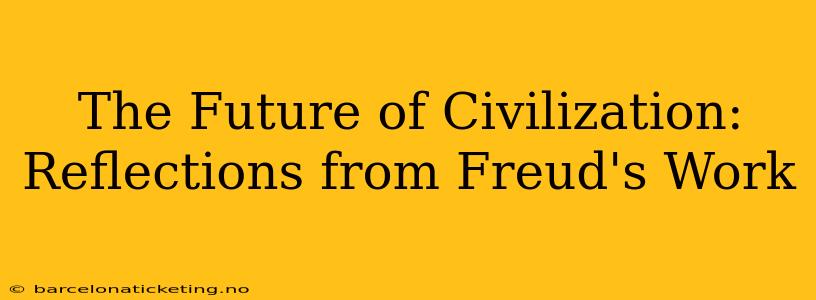Sigmund Freud, a name synonymous with psychoanalysis, offered profound insights into the human psyche that extend far beyond the consulting room. His work, particularly Civilization and Its Discontents (1930), provides a chillingly relevant framework for contemplating the future of civilization. While not a futurist in the technological sense, Freud's exploration of human aggression, societal structures, and the tension between individual desires and societal demands offers a powerful lens through which to examine our present trajectory and potential futures. This essay will delve into Freud's key ideas and their implications for understanding the challenges facing civilization today.
The Inescapable Conflict: Eros and Thanatos
Central to Freud's analysis is the conflict between Eros, the life instinct driving us towards creation, love, and connection, and Thanatos, the death instinct, manifesting as aggression, self-destruction, and a desire for the ultimate release of tension. This inherent duality within the human psyche forms the bedrock of his understanding of civilization's precarious balance. Civilization, for Freud, is a necessary but imperfect attempt to control and channel Thanatos, to sublimate destructive impulses into productive activities. However, this sublimation is never complete; the potential for societal breakdown, fueled by unresolved aggression, remains a constant threat. The rise of global conflict, social unrest, and environmental degradation arguably reflect this ongoing struggle.
The Role of Repression and Sublimation in Shaping Society
Freud argued that civilization's development requires the repression of primal instincts, particularly aggression. Society imposes rules, laws, and moral codes that curtail individual desires, promoting cooperation and social order. This repression, however, is not without its cost. Unexpressed aggression can manifest in indirect ways, such as through prejudice, competition, and even seemingly benign social conflicts. Sublimation, the channeling of aggressive energy into socially acceptable pursuits like art, sports, or scientific endeavors, offers a crucial mechanism for managing this tension. However, the effectiveness of sublimation in a world facing unprecedented challenges remains a critical question. Can creative outlets alone truly mitigate the destructive potential inherent in human nature?
Is Civilization Doomed? Freud's Pessimistic Outlook
Freud's perspective on the future of civilization was, to put it mildly, pessimistic. He viewed the inherent conflict between individual desires and societal constraints as an unavoidable source of tension. The ever-present possibility of societal collapse, fueled by unchecked aggression, loomed large in his thinking. He saw the very mechanisms designed to maintain order—the legal system, morality, religion—as constantly challenged by the raw power of the death drive. This doesn't necessarily mean he believed civilization was doomed, but rather that its survival is a constant struggle requiring vigilance and conscious effort.
What are the main criticisms of Freud's theory on civilization?
Freud's work has faced significant criticism, particularly for its perceived pessimism and lack of empirical evidence. Critics argue that his emphasis on aggression underestimates the capacity for human cooperation and altruism. They also point to the limitations of his methodology and the potential for cultural bias in his interpretations. Furthermore, his theory's emphasis on repression raises concerns about the potential for social control to become oppressive. A balanced view necessitates acknowledging these critiques while still appreciating the enduring relevance of his insights.
How does Freud's work relate to modern societal challenges?
Freud's insights into the human psyche remain surprisingly relevant to contemporary issues. The rise of nationalism, social polarization, and environmental destruction can all be interpreted through the lens of the conflict between Eros and Thanatos. The unchecked expression of aggression, fueled by social inequalities and anxieties, poses a profound threat to global stability. Understanding the underlying psychological dynamics at play is crucial for developing effective strategies for addressing these challenges.
What are some alternative perspectives on the future of civilization?
While Freud offered a rather pessimistic view, other thinkers have presented more optimistic perspectives. Some emphasize the potential for human cooperation and the development of more equitable and sustainable social systems. Technological advancements, improved communication, and increased global awareness could potentially foster greater collaboration and mitigate some of the threats identified by Freud. However, these optimistic scenarios still require addressing the inherent challenges posed by human nature, highlighting the continuing relevance of Freud's work in prompting crucial self-reflection.
Conclusion: A Necessary Dialogue
Freud's work, despite its limitations and inherent pessimism, offers a crucial framework for understanding the complex dynamics at play in shaping the future of civilization. His insights into the interplay between individual desires and societal structures provide a stark reminder of the fragility of social order and the ever-present potential for conflict. Engaging with Freud's ideas forces us to confront uncomfortable truths about human nature and the challenges we face in building a sustainable and equitable future. The conversation he began remains essential, even more so now than during his time, as we grapple with unprecedented challenges to global stability and human well-being. His work serves as a constant call for critical self-reflection and a renewed commitment to understanding and managing the forces that shape our collective destiny.

